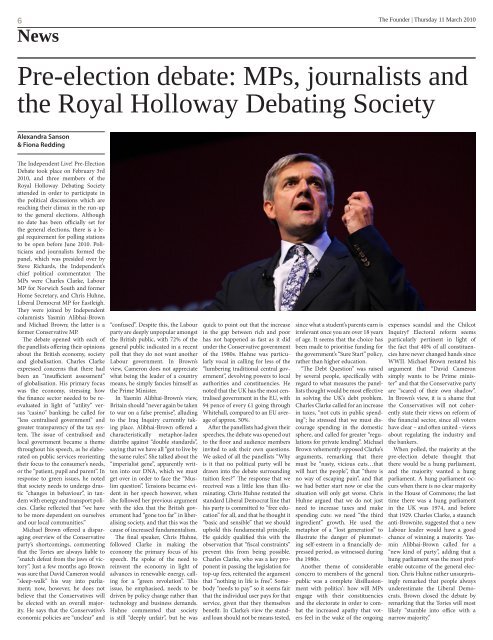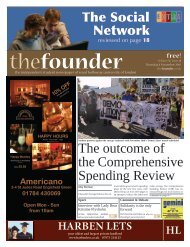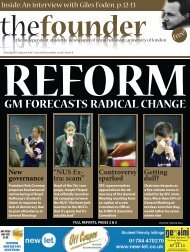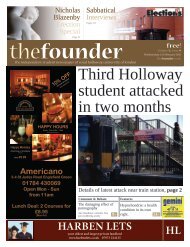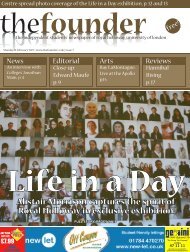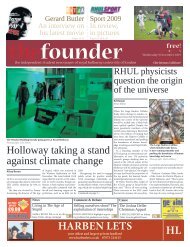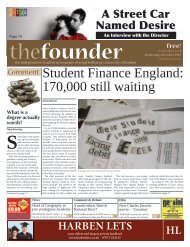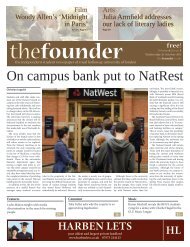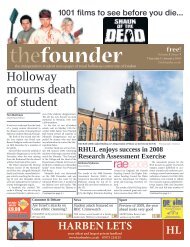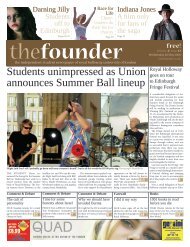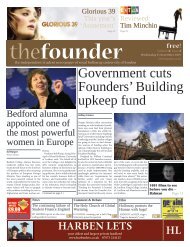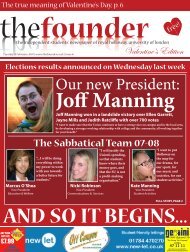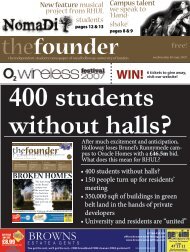HARBEN LETS HL Fashion Show Preview - The Founder
HARBEN LETS HL Fashion Show Preview - The Founder
HARBEN LETS HL Fashion Show Preview - The Founder
Create successful ePaper yourself
Turn your PDF publications into a flip-book with our unique Google optimized e-Paper software.
6<br />
News<br />
<strong>The</strong> <strong>Founder</strong> | Thursday 11 March 2010<br />
Pre-election debate: MPs, journalists and<br />
the Royal Holloway Debating Society<br />
Alexandra Sanson<br />
& Fiona Redding<br />
<strong>The</strong> Independent Live! Pre-Election<br />
Debate took place on February 3rd<br />
2010, and three members of the<br />
Royal Holloway Debating Society<br />
attended in order to participate in<br />
the political discussions which are<br />
reaching their climax in the run-up<br />
to the general elections. Although<br />
no date has been officially set for<br />
the general elections, there is a legal<br />
requirement for polling stations<br />
to be open before June 2010. Politicians<br />
and journalists formed the<br />
panel, which was presided over by<br />
Steve Richards, the Independent’s<br />
chief political commentator. <strong>The</strong><br />
MPs were Charles Clarke, Labour<br />
MP for Norwich South and former<br />
Home Secretary, and Chris Huhne,<br />
Liberal Democrat MP for Eastleigh.<br />
<strong>The</strong>y were joined by Independent<br />
columnists Yasmin Alibhai-Brown<br />
and Michael Brown; the latter is a<br />
former Conservative MP.<br />
<strong>The</strong> debate opened with each of<br />
the panellists offering their opinions<br />
about the British economy, society<br />
and globalisation. Charles Clarke<br />
expressed concerns that there had<br />
been an “insufficient assessment”<br />
of globalisation. His primary focus<br />
was the economy, stressing how<br />
the finance sector needed to be reevaluated<br />
in light of “utility” versus<br />
“casino” banking; he called for<br />
“less centralised government” and<br />
greater transparency of the tax system.<br />
<strong>The</strong> issue of centralised and<br />
local government became a theme<br />
throughout his speech, as he elaborated<br />
on public services reorienting<br />
their focus to the consumer’s needs,<br />
or the “patient, pupil and parent”. In<br />
response to green issues, he noted<br />
that society needs to undergo drastic<br />
“changes in behaviour”, in tandem<br />
with energy and transport policies.<br />
Clarke reflected that “we have<br />
to be more dependent on ourselves<br />
and our local communities.”<br />
Michael Brown offered a disparaging<br />
overview of the Conservative<br />
party’s shortcomings, commenting<br />
that the Tories are always liable to<br />
“snatch defeat from the jaws of victory”.<br />
Just a few months ago Brown<br />
was sure that David Cameron would<br />
“sleep-walk” his way into parliament;<br />
now, however, he does not<br />
believe that the Conservatives will<br />
be elected with an overall majority.<br />
He says that the Conservative’s<br />
economic policies are “unclear” and<br />
“confused”. Despite this, the Labour<br />
party are deeply unpopular amongst<br />
the British public, with 72% of the<br />
general public indicated in a recent<br />
poll that they do not want another<br />
Labour government. In Brown’s<br />
view, Cameron does not appreciate<br />
what being the leader of a country<br />
means, he simply fancies himself as<br />
the Prime Minister.<br />
In Yasmin Alibhai-Brown’s view,<br />
Britain should “never again be taken<br />
to war on a false premise”, alluding<br />
to the Iraq Inquiry currently taking<br />
place. Alibhai-Brown offered a<br />
characteristically metaphor-laden<br />
diatribe against “double standards”,<br />
saying that we have all “got to live by<br />
the same rules”. She talked about the<br />
“imperialist gene”, apparently written<br />
into our DNA, which we must<br />
get over in order to face the “Muslim<br />
question”. Tensions became evident<br />
in her speech however, when<br />
she followed her previous argument<br />
with the idea that the British government<br />
had “gone too far” in liberalising<br />
society, and that this was the<br />
cause of increased fundamentalism.<br />
<strong>The</strong> final speaker, Chris Huhne,<br />
followed Clarke in making the<br />
economy the primary focus of his<br />
speech. He spoke of the need to<br />
reinvent the economy in light of<br />
advances in renewable energy, calling<br />
for a “green revolution”. This<br />
issue, he emphasised, needs to be<br />
driven by policy change rather than<br />
technology and business demands.<br />
Huhne commented that society<br />
is still “deeply unfair”, but he was<br />
quick to point out that the increase<br />
in the gap between rich and poor<br />
has not happened as fast as it did<br />
under the Conservative government<br />
of the 1980s. Huhne was particularly<br />
vocal in calling for less of the<br />
“lumbering traditional central government”,<br />
devolving powers to local<br />
authorities and constituencies. He<br />
noted that the UK has the most centralised<br />
government in the EU, with<br />
94 pence of every £1 going through<br />
Whitehall, compared to an EU average<br />
of approx. 50%.<br />
After the panellists had given their<br />
speeches, the debate was opened out<br />
to the floor and audience members<br />
invited to ask their own questions.<br />
We asked of all the panellists “Why<br />
is it that no political party will be<br />
drawn into the debate surrounding<br />
tuition fees?” <strong>The</strong> response that we<br />
received was a little less than illuminating.<br />
Chris Huhne restated the<br />
standard Liberal Democrat line that<br />
his party is committed to “free education”<br />
for all, and that he thought it<br />
“basic and sensible” that we should<br />
uphold this fundamental principle.<br />
He quickly qualified this with the<br />
observation that “fiscal constraints”<br />
prevent this from being possible.<br />
Charles Clarke, who was a key proponent<br />
in passing the legislation for<br />
top-up fees, reiterated the argument<br />
that “nothing in life is free”. Somebody<br />
“needs to pay” so it seems fair<br />
that the individual user pays for that<br />
service, given that they themselves<br />
benefit. In Clarke’s view the standard<br />
loan should not be means tested,<br />
since what a student’s parents earn is<br />
irrelevant once you are over 18 years<br />
of age. It seems that the choice has<br />
been made to prioritise funding for<br />
the government’s “Sure Start” policy,<br />
rather than higher education.<br />
“<strong>The</strong> Debt Question” was raised<br />
by several people, specifically with<br />
regard to what measures the panellists<br />
thought would be most effective<br />
in solving the UK’s debt problem.<br />
Charles Clarke called for an increase<br />
in taxes, “not cuts in public spending”;<br />
he stressed that we must discourage<br />
spending in the domestic<br />
sphere, and called for greater “regulations<br />
for private lending”. Michael<br />
Brown vehemently opposed Clarke’s<br />
arguments, remarking that there<br />
must be “nasty, vicious cuts…that<br />
will hurt the people”, that “there is<br />
no way of escaping pain”, and that<br />
we had better start now or else the<br />
situation will only get worse. Chris<br />
Huhne argued that we do not just<br />
need to increase taxes and make<br />
spending cuts: we need “the third<br />
ingredient” growth. He used the<br />
metaphor of a “lost generation” to<br />
illustrate the danger of plummeting<br />
self-esteem in a financially depressed<br />
period, as witnessed during<br />
the 1980s.<br />
Another theme of considerable<br />
concern to members of the general<br />
public was a complete ‘disillusionment<br />
with politics’: how will MPs<br />
engage with their constituencies<br />
and the electorate in order to combat<br />
the increased apathy that voters<br />
feel in the wake of the ongoing<br />
expenses scandal and the Chilcot<br />
Inquiry? Electoral reform seems<br />
particularly pertinent in light of<br />
the fact that 40% of all constituencies<br />
have never changed hands since<br />
WWII. Michael Brown restated his<br />
argument that “David Cameron<br />
simply wants to be Prime minister”<br />
and that the Conservative party<br />
are “scared of their own shadow”.<br />
In Brown’s view, it is a shame that<br />
the Conservatives will not coherently<br />
state their views on reform of<br />
the financial sector, since all voters<br />
have clear – and often united - views<br />
about regulating the industry and<br />
the bankers.<br />
When polled, the majority at the<br />
pre-election debate thought that<br />
there would be a hung parliament,<br />
and the majority wanted a hung<br />
parliament. A hung parliament occurs<br />
when there is no clear majority<br />
in the House of Commons; the last<br />
time there was a hung parliament<br />
in the UK was 1974, and before<br />
that 1929. Charles Clarke, a staunch<br />
anti-Brownite, suggested that a new<br />
Labour leader would have a good<br />
chance of winning a majority. Yasmin<br />
Alibhai-Brown called for a<br />
“new kind of party”, adding that a<br />
hung parliament was the most preferable<br />
outcome of the general election.<br />
Chris Huhne rather unsurprisingly<br />
remarked that people always<br />
underestimate the Liberal Democrats.<br />
Brown closed the debate by<br />
remarking that the Tories will most<br />
likely “stumble into office with a<br />
narrow majority.”


